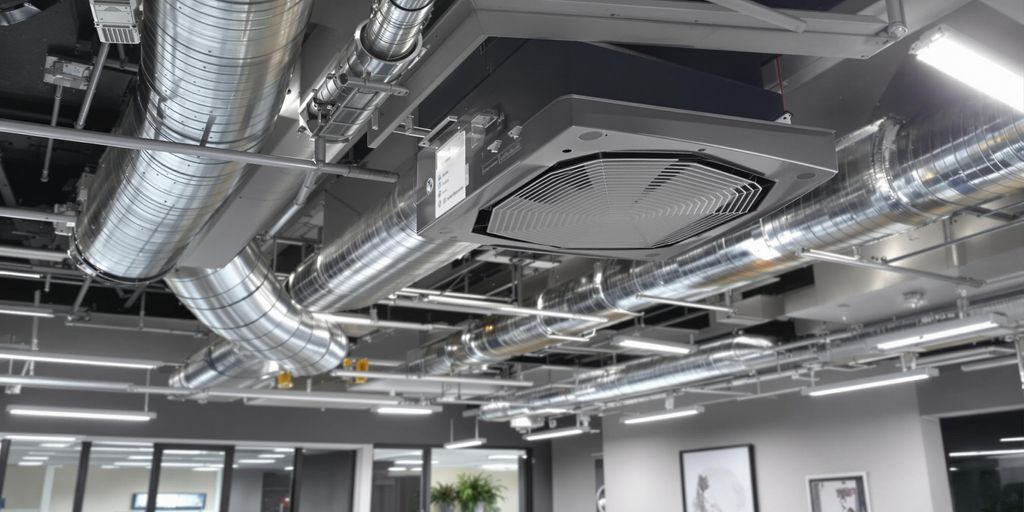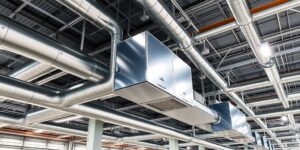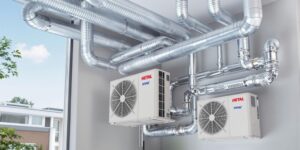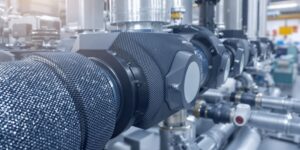Running a business today means thinking about all sorts of things, and one biggie is the HVAC system. It’s not just about keeping the place warm in winter or cool in summer. A commercial HVAC system is a key player in making sure your team and customers are comfy, which in turn keeps the business humming along smoothly. This guide is here to break down everything you need to know about commercial HVAC systems, from picking the right one to keeping it in top shape.
Key Takeaways
- Commercial HVAC systems are essential for maintaining a comfortable business environment.
- Choosing the right system involves considering factors like size, efficiency, and building needs.
- Regular maintenance is crucial to extend the life of the HVAC system and improve efficiency.
- Energy-efficient systems can significantly reduce operational costs and environmental impact.
- Professional installation and service ensure optimal performance and compliance with standards.
Understanding Commercial HVAC Systems
Key Components of Commercial HVAC Systems
Commercial HVAC systems are like the backbone of any large building, ensuring a comfy environment all year round. They are complex beasts with several key parts working together. The main components include heating units, ventilation systems, and air conditioning units.
- Heating Units: These are usually boilers or furnaces that generate warmth by burning fuel or using electricity.
- Ventilation Systems: These keep air circulating, pulling in fresh air and pushing out stale air, helping maintain good air quality.
- Air Conditioning Units: These units cool the air, making hot summer days bearable indoors.
Additionally, there are thermostats, dampers, and ductwork, all playing crucial roles in regulating temperature and airflow.
Differences Between Commercial and Residential HVAC
While both commercial and residential HVAC systems aim to control indoor climate, they differ significantly in scope and complexity. Commercial systems are designed to handle larger spaces and more significant demands.
- Size and Power: Commercial units are larger and more powerful, built to heat or cool vast spaces like office buildings or malls.
- Complexity: These systems often feature more sophisticated controls and zoning capabilities to manage different building areas efficiently.
- Customization: Commercial systems are often tailored to specific building needs, unlike residential units that follow more standardized designs.
Common Challenges in Commercial HVAC
Dealing with commercial HVAC systems isn’t always smooth sailing. There are several common issues that businesses might encounter.
- Energy Efficiency: Ensuring the system is energy-efficient can be tricky, especially with older systems.
- Maintenance: Regular maintenance is crucial to prevent breakdowns and ensure longevity, yet it can be overlooked.
- System Sizing: An improperly sized system can lead to inefficiency and increased costs, whether it’s too big or too small.
Keeping a commercial HVAC system in top shape requires attention to detail and regular check-ups. Ignoring small issues can lead to bigger problems down the road. Properly understanding your system’s needs can save both time and money.
Choosing the Right Commercial HVAC System
Factors to Consider When Selecting an HVAC System
Picking the right commercial HVAC system is a bit like finding the perfect pair of shoes. It needs to fit just right and suit your building’s needs. Here are some key factors to keep in mind:
- Understand Your Space: The size and layout of your building are crucial. Larger spaces might need systems like VRF/VRV or chillers, while smaller areas might do well with single or multi-split systems.
- Climate Considerations: The weather in your area plays a big role. If you’re in a place with extreme temperatures, you’ll need a system that can handle those swings efficiently.
- Energy Efficiency Goals: With energy costs rising, it’s smart to pick a system that saves power. Look for high SEER and EER ratings.
- Budget Constraints: Don’t just look at the upfront cost. Think about the total cost of ownership, including installation, maintenance, and energy savings over time.
The Importance of Proper Sizing
Getting the size of your HVAC system right is super important. Too small, and it struggles to keep up. Too big, and it cycles on and off too much, which can wear it out faster and boost your energy bills. A professional assessment can help you get it just right, considering factors like square footage, ceiling height, and insulation.
Tailoring HVAC Solutions to Building Needs
Every building is unique, with its own quirks and challenges. Maybe you have rooms that need different temperatures or areas that see more sun. A zoned HVAC system could be the answer, allowing for different settings in different areas. This way, you save energy by not over-cooling or over-heating spaces that don’t need it.
Picking the right HVAC system isn’t just about comfort; it’s about smart choices that save money and energy in the long run. Tailored solutions ensure that every corner of your building stays just right, without wasting resources.
Enhancing Energy Efficiency in Commercial HVAC

Benefits of Energy-Efficient HVAC Systems
Switching to energy-efficient HVAC systems is like trading in that old gas-guzzler for a sleek hybrid. The savings on energy bills alone can be substantial, not to mention the positive impact on the environment. Businesses can cut down on operational costs while also reducing their carbon footprint. Energy-efficient systems often come with advanced features that improve comfort levels in the workplace, making everyone a bit happier.
Upgrading to High-Efficiency Equipment
If you’re dealing with outdated HVAC equipment, it’s time to consider an upgrade. Modern systems offer better performance and efficiency. Look for models with high SEER ratings, which indicate how efficiently they convert energy into cooling. Upgrading can initially seem costly, but the return on investment is clear when you start seeing lower utility bills. In some regions, there are even incentives and rebates available to offset the initial costs.
The Role of Smart Controls and Automation
Smart controls and automation are game-changers in the HVAC world. These technologies allow for precise management of heating and cooling systems, ensuring they operate only when needed. Smart thermostats learn from your patterns and adjust settings automatically, which can significantly reduce energy waste. Plus, with building automation systems, you can manage everything from HVAC to lighting with the touch of a button, streamlining operations and enhancing efficiency across the board.
Maintenance Strategies for Commercial HVAC Systems
Essential Maintenance Tasks for Longevity
Think of your commercial HVAC system like a marathon runner. Just as athletes need regular training and check-ups, your HVAC system requires consistent care to perform its best. Regular maintenance is not optional; it’s necessary to ensure everything works as intended and to minimize unexpected breakdowns. Simple tasks like changing filters regularly can extend your system’s life significantly.
- Regular Cleaning and Inspection: Dust and debris are the main enemies of HVAC systems. Schedule professional cleanings at least twice a year to keep everything running smoothly. During these visits, technicians should inspect components for wear and tear, catching issues early to prevent costly repairs.
- Changing Filters Regularly: This is the simplest yet most overlooked step. Change air filters every three months at a minimum, but more often in high-use periods or dusty environments. Clean filters improve air quality and maintain airflow efficiency, reducing strain on the system.
- Scheduling Seasonal Tune-Ups: Different seasons put different demands on your HVAC system. Plan major maintenance activities during shoulder seasons to minimize disruption. Each spring, prepare for summer cooling by deep cleaning cooling components, checking refrigerant levels, and testing cooling capacity.
Seasonal Maintenance Checklists
Preparing your HVAC system for seasonal changes is crucial. Here’s a quick checklist to ensure your system is ready for the summer:
- Deep clean all cooling components.
- Check refrigerant levels and cooling capacity.
- Inspect insulation and verify economizer function.
- Test and calibrate thermostats.
- Ensure all electrical connections are secure.
The Impact of Regular Maintenance on Efficiency
Regular maintenance isn’t just about avoiding breakdowns; it’s about efficiency too. A well-maintained system runs more smoothly, consuming less energy and cutting down on utility bills.
A proactive maintenance plan tailored to your specific equipment will keep things cool—or warm—as needed. Just like you wouldn’t drive a car without regular oil changes, don’t let your HVAC system run without its regular check-ups.
By sticking to a regular maintenance schedule, you can extend the lifespan of your HVAC system and keep it running efficiently, saving money in the long run. Regular maintenance of commercial HVAC units is crucial for efficiency and indoor air quality. Monthly inspection and timely replacement of filters are essential practices to ensure optimal performance.
Innovations in Commercial HVAC Technology
Emerging Trends in HVAC Technology
The world of commercial HVAC is buzzing with new trends that are changing how businesses manage their indoor climates. Now, more than ever, there’s a push towards environmentally-friendly units, which means integrating renewable energy sources like solar panels and wind turbines. These innovations help cut down on energy costs and reduce carbon footprints. It’s not just about heating and cooling anymore—it’s about doing so sustainably.
The Role of IoT and Smart Devices
Smart devices and the Internet of Things (IoT) are making waves in HVAC systems. With IoT, businesses can monitor and adjust their HVAC systems in real-time, no matter where they are. This means you can tweak your settings from your phone or computer, ensuring optimal conditions without wasting energy. Imagine having a system that learns your preferences and adjusts itself—it’s like having a personal climate assistant.
- Remote Monitoring: Control your HVAC system from anywhere, anytime.
- Data Analytics: Use insights to optimize energy use and save money.
- Health and Safety Features: Improve air quality with advanced monitoring.
Future Prospects for HVAC Systems
Looking ahead, the future of HVAC technology promises even more advancements. Expect systems that are not only more efficient but also smarter and more user-friendly. The integration of AI and machine learning is set to revolutionize predictive maintenance, reducing downtime and repair costs. Geothermal systems, which use the earth’s stable temperature for heating and cooling, are also gaining traction as a sustainable option.
Embracing these innovations means businesses can enjoy a comfortable environment while being kind to the planet. The future of HVAC is not just about comfort—it’s about smart, sustainable living.
The Role of HVAC in Indoor Air Quality
HVAC systems do more than just control temperature; they play a big part in maintaining indoor air quality (IAQ). These systems circulate air throughout the building, filtering out dust, allergens, and other pollutants. Without them, indoor spaces would quickly become stuffy and uncomfortable.
Technologies for Improving Indoor Air Quality
Modern HVAC systems come equipped with advanced technologies to enhance air quality:
- HEPA Filters: These high-efficiency particulate air filters capture tiny particles, improving air cleanliness.
- UV Light Systems: Installed within the HVAC, they neutralize bacteria and viruses, reducing the spread of illness.
- Ventilation Enhancements: Systems can incorporate fresh air intakes to dilute indoor pollutants, ensuring a steady supply of clean air.
The Importance of Regular Filter Changes
Changing filters regularly is crucial for maintaining good IAQ. Dirty filters can restrict airflow, causing the system to work harder and less efficiently. Here’s a quick guide to filter maintenance:
- Check filters monthly to assess if they need replacing.
- Replace filters every 1-3 months depending on usage and filter type.
- Consider upgrading to higher efficiency filters if air quality is a concern.
Regular maintenance and timely filter changes can significantly improve the performance of your HVAC system, leading to better air quality and energy efficiency.
For more on how HVAC systems ensure adequate ventilation, check out this detailed overview.
Cost Considerations for Commercial HVAC Systems
Initial Investment vs. Long-Term Savings
When diving into the world of commercial HVAC systems, the initial price tag can be intimidating. The cost of installing a commercial HVAC system can range from $30,000 to over $100,000, depending on factors like system complexity, building size, and any additional features you might need. While this might seem like a hefty expense upfront, it’s important to weigh this against the potential long-term savings. Energy-efficient systems, for instance, can significantly reduce your monthly utility bills, helping to offset the initial investment over time. Think of it as a long-term commitment to saving both energy and money.
Financing Options for HVAC Upgrades
Not everyone can shell out the full cost of a new HVAC system all at once, and that’s where financing options come into play. Many businesses opt for leasing or financing plans that allow them to spread the cost over several years. This approach not only makes the investment more manageable but also enables businesses to benefit from modern, efficient systems without waiting. It’s worth exploring various options, including loans, leases, and even government incentives, which can sometimes offer favorable terms for energy-efficient upgrades.
Calculating Return on Investment
Calculating the return on investment (ROI) for a commercial HVAC system isn’t just about comparing the initial costs with the monthly savings. It’s about understanding the full picture. Consider factors like reduced maintenance costs, potential tax benefits, and increased property value. An energy-efficient system can also improve indoor air quality, leading to healthier, more productive employees, which is an intangible yet valuable return. By taking a comprehensive look at these elements, businesses can make informed decisions that align with their financial and operational goals.
Investing in a commercial HVAC system is not just about the immediate cost. It’s a strategic decision that impacts energy efficiency, employee comfort, and long-term financial health. Balancing upfront costs with potential savings is key to making the right choice.
The Importance of Professional Installation and Service

Choosing the Right HVAC Contractor
Picking the right HVAC contractor is like choosing a good mechanic for your car. You want someone who knows the ins and outs of the system, ensuring everything works smoothly. Professional HVAC installation ensures that trained technicians choose the right size unit for your home and properly set up your climate control systems. It’s not just about getting the job done; it’s about getting it done right. Look for contractors who are licensed, have good reviews, and come recommended by people you trust.
The Benefits of Professional Installation
Professional installation isn’t just about putting pieces together; it’s about understanding the system’s needs and tailoring the setup accordingly. When a pro handles the installation, they ensure the unit is the right fit for your building’s size and requirements. This attention to detail helps in reducing energy costs and prolongs the system’s life. Plus, it can prevent those annoying breakdowns that seem to happen at the worst times.
Ensuring Compliance with Industry Standards
Staying compliant with industry standards isn’t just a box to tick. It’s crucial for safety and efficiency. Professionals are up-to-date with the latest codes and regulations, meaning your system will meet all necessary standards. This compliance is vital not only for safety but also for insurance and warranty purposes.
Regular professional service ensures that your HVAC system runs efficiently and safely, reducing the risk of costly repairs down the line. It’s not just about fixing things when they break; it’s about maintaining a smooth operation year-round.
Wrapping It Up: Making the Most of Your Commercial HVAC System
So, there you have it. Navigating the world of commercial HVAC systems might seem like a big task, but it’s all about finding what works best for your business. From choosing the right size and type to keeping up with maintenance, every step counts. Remember, a well-chosen and maintained HVAC system doesn’t just keep your space comfy—it can save you money and help the environment too. Whether you’re upgrading or just starting out, take the time to understand your options and make informed decisions. In the end, it’s about creating a space that’s not only efficient but also welcoming for everyone who walks through your doors. Keep these tips in mind, and you’ll be well on your way to maximizing efficiency in your business.
Frequently Asked Questions
What is a commercial HVAC system?
A commercial HVAC system is a setup that provides heating, ventilation, and air conditioning to large buildings like offices and stores. It helps keep the indoor environment comfortable for people inside.
How is a commercial HVAC different from a residential one?
Commercial HVAC systems are usually bigger and more complex than the ones used in homes. They are designed to handle larger spaces and more people, while residential systems are meant for smaller areas.
Why is regular maintenance important for HVAC systems?
Regular maintenance keeps HVAC systems running smoothly and efficiently. It helps prevent breakdowns and can extend the life of the equipment, saving money in the long run.
What are energy-efficient HVAC systems?
Energy-efficient HVAC systems use less energy to heat or cool a building. They help save on energy bills and are better for the environment because they reduce energy consumption.
How do smart controls improve HVAC systems?
Smart controls allow you to manage your HVAC system using a phone or computer. They can learn your schedule and adjust settings automatically, which saves energy and keeps the temperature just right.
What should I consider when choosing a commercial HVAC system?
When picking a commercial HVAC system, think about the size of your building, how many people use it, and your energy efficiency goals. It’s also important to get the right size system to avoid wasting energy.




